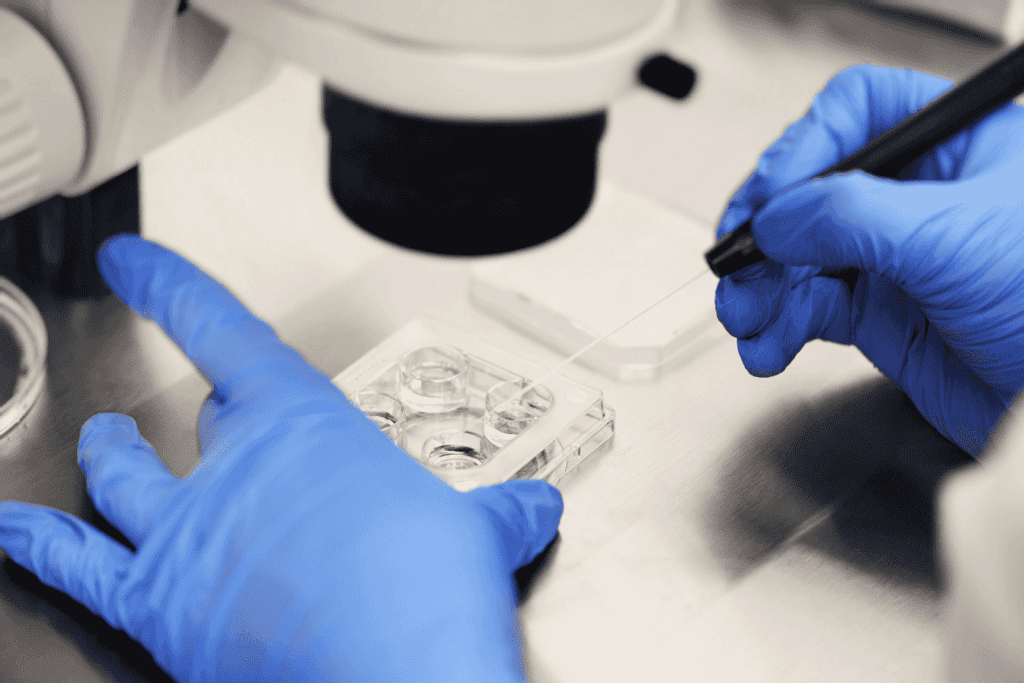Prepare Yourself as an IVF Laboratory Trainee
Embarking on a career in embryology is an exciting and rewarding journey, especially when it involves working in an In Vitro Fertilization (IVF) laboratory. Whether you’re just beginning your training or expanding your expertise, proper preparation is key to ensuring success. An IVF laboratory is a controlled, highly technical environment where precision and adherence to protocols can directly impact patient outcomes. Preparing yourself for this environment is essential to building a strong foundation in embryology.
Here’s how you can prepare for a successful transition into the IVF lab:
-
Understand the IVF Laboratory Environment
The IVF lab is a highly specialized space where every detail matters. Before entering the lab, it’s important to familiarize yourself with the environment:
- Sterility and Contamination Prevention: The IVF lab requires strict sterility protocols. You’ll be working with gametes (sperm and eggs) and embryos that are highly sensitive to contamination. Sterile technique, personal protective equipment (PPE), and proper handling of laboratory equipment are crucial to protecting the biological material and ensuring successful outcomes. A study in the Journal of Assisted Reproduction and Geneticshighlighted that maintaining a contaminant-free environment significantly improves embryo viability (Jain & Singh, 2017).
- Environmental Control: IVF labs are designed with tightly regulated temperature, humidity, and air quality controls. You must understand how these factors affect gamete and embryo development and how deviations can compromise the IVF process.
-
Master the Essential Lab Skills
As a trainee, your ability to master specific lab skills will define your success. These include both basic and advanced techniques:
- Microscopy Skills: Microscopy is at the heart of IVF procedures, from sperm analysis to embryo grading. Practicing precision in using inverted microscopes and mastering the ability to evaluate cells under different magnifications are foundational to embryology work.
- Handling Micromanipulation Equipment: Techniques such as Intracytoplasmic Sperm Injection (ICSI) require the use of micromanipulators. Developing a steady hand and familiarity with this delicate procedure is crucial as it directly impacts fertilization success rates. Research shows that high proficiency in micromanipulation can significantly increase fertilization rates during ICSI (Palermo et al., 2019).
- Cryopreservation Techniques: Learning the correct protocols for freezing eggs, sperm, and embryos using vitrification methods is essential. The cryopreservation process has evolved significantly, with vitrification improving survival rates post-thaw and leading to higher success rates in subsequent IVF cycles (Cobo & Diaz, 2011).
-
Prioritize Laboratory Safety
Safety in the IVF laboratory cannot be overstated. As a trainee, familiarize yourself with all laboratory safety protocols to protect both yourself and the delicate biological materials you’ll be working with. Key areas include:
- Handling Hazardous Materials: IVF labs often use chemicals and substances like culture media and disinfectants, some of which may pose risks if not handled properly. Always adhere to the lab’s safety data sheets (SDS) and standard operating procedures (SOPs).
- Proper Use of PPE: Always use the appropriate PPE, including lab coats, gloves, and masks, to minimize contamination risks. Learning to work within a sterile field is a critical skill in the IVF setting.
-
Keep Up with Scientific Developments
Embryology is a rapidly advancing field, with new technologies and protocols continuously emerging. Staying up-to-date with the latest research is vital to your development as an embryologist. Subscribing to journals like Fertility and Sterilityor attending conferences can help you stay informed on the most recent advancements in assisted reproductive technologies (ART). For example, new research on time-lapse embryo imaging has revolutionized how embryologists assess embryo viability, offering insights that improve IVF success rates (Rubio et al., 2020).
-
Focus on Communication and Teamwork
While technical skills are essential, success in the IVF lab also depends on your ability to work effectively within a multidisciplinary team. IVF centers rely on close collaboration between embryologists, clinicians, and nurses. Open communication and a shared understanding of patient care protocols ensure that each step of the IVF process is seamlessly integrated.
- Documenting Procedures: Properly documenting every step of the laboratory process is crucial for ensuring traceability and accountability. Learn the lab’s reporting systems and how to communicate embryo development results clearly and effectively with the team.
- Participating in Case Discussions: As a trainee, actively engage in discussions during patient case reviews. This will help you understand the clinical rationale behind treatment decisions and improve your ability to contribute meaningfully to patient care.
-
Develop a Growth Mindset
Finally, entering an IVF laboratory as a trainee means embracing a growth mindset. You will face challenges, and some tasks may initially feel overwhelming. However, adopting a mindset of continuous learning and improvement will serve you well. Remember that proficiency in embryology requires practice, and it’s okay to take the time to master your skills.
Mentorship is an invaluable part of your journey. Don’t hesitate to seek advice from senior embryologists or lab managers who can provide insights and guidance. Research shows that mentorship improves knowledge retention and skill development, helping trainees become more competent embryologists (Heneghan et al., 2018).
Conclusion: Your Journey to Becoming an Embryologist
Preparing yourself to enter an IVF lab requires both technical knowledge and an understanding of the lab environment. Mastering lab skills, prioritizing safety, staying updated on the latest scientific advancements, and developing effective communication are all key to your success. By embracing a growth mindset and seeking guidance from experienced professionals, you’ll be well on your way to becoming a skilled and confident embryologist.
At IRH we are dedicated to helping trainees develop the expertise they need to thrive in an IVF laboratory. Through hands-on training, mentorship, and cutting-edge resources, we prepare you for a fulfilling career in the exciting world of reproductive science.
References
(6 Powerful Tips to Prepare Yourself as an IVF Laboratory Trainee)
Cobo, A., & Diaz, C. (2011). Clinical application of oocyte vitrification: a systematic review and meta-analysis of randomized controlled trials. Fertility and Sterility, 96(2), 277-285.
Heneghan, C., Spencer, E. A., & Mahtani, K. R. (2018). Embryology training and mentorship: Learning from experience. Journal of Assisted Reproduction and Genetics, 35(5), 699-704.
Jain, A., & Singh, A. (2017). Sterility and contamination in the IVF laboratory: An overview. Journal of Assisted Reproduction and Genetics, 34(7), 925-931.
Palermo, G., Neri, Q. V., Hariprashad, J. J., Davis, O. K., Veeck, L. L., & Rosenwaks, Z. (2019). The impact of micromanipulation skills on ICSI outcomes. Human Reproduction, 34(1), 23-30.
Rubio, I., Galán, A., Larreategui, Z., Ayerdi, F., & Miguelez, J. (2020). Time-lapse imaging in the IVF laboratory: A step forward in assessing embryo viability. Fertility and Sterility, 114(3), 580-589



